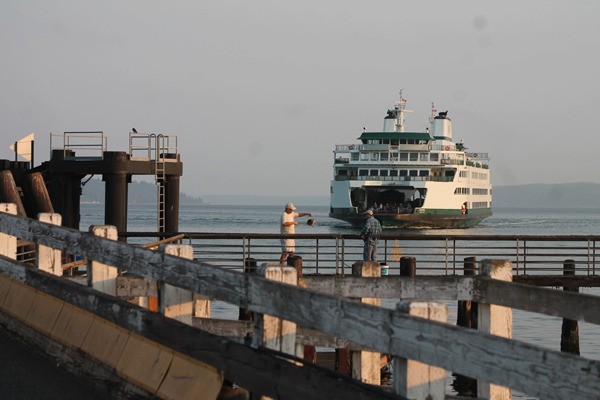The state must tear out and replace soundproofing material on its two newest ferries because the U.S. Coast Guard is concerned it may cause excessive smoke and flames in the event of a fire.
Workers on Wednesday will begin removing the material from the Samish in accordance with a nationwide directive issued by the Coast Guard in September 2014.
The process will be repeated on the Tokitae starting early next year, a Washington State Ferry spokesman said.
Vigor Industrial, which built the Olympic Class 144-vehicle ferries, will handle the projects and pick up the tab.
“There is no cost to taxpayers because it is covered under the terms of the construction contract,” said Ian Sterling, spokesman for Washington State Ferries.
This problem isn’t exclusive to Washington State Ferries.
Two research vessels in Washington also using the material must make changes.
Those vessels are owned by the U.S. Navy and operated by the Scripps Institution of Oceanography and Woods Hole Oceanographic Institution.
And between 70 and 100 marine vessels in the Gulf Coast region will need to undergo similar repairs, according to a Coast Guard spokesman.
The Coast Guard issued its marine safety directive Sept. 19, 2014. It calls for an immediate end to use of certain sound dampening products made of mass loaded vinyl. It singled out one brand, Vinaflex, which is sold commercially and is currently installed around engine rooms, decks and other areas on various types of vessels.
Lt. Dana Warr, a Coast Guard public affairs officer, said the products were extensively tested by the Southwest Research Center before the safety bulletin went out.
“In its natural state it is not hazardous to passengers or crew,” he said.
“However, in an onboard fire situation the product does become hazardous due to excessive flaming and excessive smoke. It’s a safety concern for the first responders if there is a fire on the ship.”
Until the material is replaced, additional breathing apparatus will be carried on each of the ferries, Sterling said.
When the directive came out, the Tokitae had been in service for three months on the Mukilteo-Clinton route and the Samish was nearly built.
The directive did not set a deadline for replacing the material. And the Coast Guard said it “stands ready to assist” vessel owners and operators figure out what type of sound dampening product will meet its fire protection requirements.
It took several months for the Coast Guard to approve an alternative product for use on the two ferries, as well as on the third Olympic Class ferry now being built.
The replacement work won’t prevent the Samish from continuing to operate on its Anacortes-San Juan Islands route.
Riders will see areas cordoned off as workers pull off drywall, remove the soundproofing insulation and install a replacement material made up of a product known as lead foil, Sterling said.
Each ferry will be taken out of service when the area around the engine room is ready to be worked on. That won’t happen until January, Sterling said.
Once the Samish is nearly or completely finished, the same process will begin with the Tokitae, and wrap up in spring 2016, he said.



